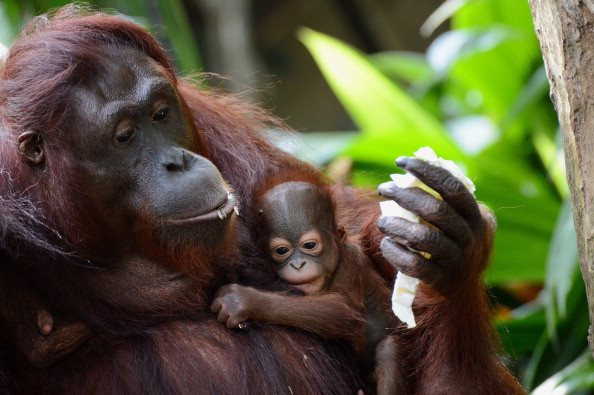About 150,000 Bornean orangutans have disappeared in just 16 years
KEY POINTS
- If nothing changes, 45,000 more orangutans will disappear in the next 35 years.
- Deforestation is to blame, but so are orangutan killings.
- The Bornean orangutan was decalred critically endangered in 2016.
About half of the orangutans living on the island of Borneo have died in a 16-year period. New estimates published today (15 February) in Current Biology show that 148,500 orangutans disappeared between 1999 and 2015.
An international team of experts observed 36,555 orangutan nests and compiled field surveys conducted from 1999 to 2015. They found that about half of the island's orangutan population had disappeared in that time span. Additionally, researchers suggest 38 of the 64 identified separated groups of orangutans are above the lower limit to be considered viable, which is of 100 individuals.
This drop in the orangutan population is explained by invasive and unregulated industries, such as the production of palm oil, paper, logging or mining, which lead to massive deforestation and directly reduce the primates' habitat. Orangutans struggle to live outside forests and need the cover of trees to survive.
The Bornean Orangutan was declared critically endangered in 2016 by the International Union for the Conservation of Nature (IUCN) red list.
Palm oil is often cited as the main culprit when it comes to orangutan deaths, but other unregulated industries have catastrophic implications for the animals' lives.
"I would say most industries are poorly regulated if it comes to things like protecting orangutans," Chair of the IUCN Oil Palm Task Force Erik Meijaard told IBTimesUK. "On paper it all looks fine, but the reality is that many orangutans are killed every year and that the habitat is still cut down."
When it comes to palm oil, Meijaard says banning its production is not a viable option: "A lot of people call for a ban on palm oil but forget that this would have impacts on other areas that would then need to be used to produce other crops (soy, maize, canola, etc)."
However, one thing people can do is make sure they buy the right products: "Consumers need to keep pushing for improved production practices and can do that by buying products with certified palm oil only, and then make sure the certification is meaningful on the ground," Meijaard says.
He also mentions the case of one palm oil company called PT KAL, located in West Kalimantan, which protected 150 orangutans in its concession. "Of course, this company is an exception," he says, "but it does show that orangutans can be managed in an oil palm context to some extent."

Licensed to be killed
Unregulated industries are not the Bornean orangutans' only problem. While their habitat is reducing drastically, they are also hunted animals.
The researchers predict that 45,000 more orangutans will be lost in the next 35 years if deforestation continues at the same pace. However, other factors such as hunting and conflicts within their nests mean an even higher number could die in that time frame.
"Those 45,000 are only due to habitat loss, and do not include hunting," co-author and Co-Chair of the IUCN Species Survival Commission Primate Specialist Group told IBTimesUK. "It is always hard to predict things, but I think it is fair to state that if things continue at the current pace, in 35 years we will be left with a few populations but most populations will be either lost or much smaller than they are today."
Not all is lost; tougher regulation of industries in Borneo as well as public education and raised awareness are key to the orangutans' survival.
"Orangutans are flexible and can survive to some extent in a mosaic of forests, plantations and logged forest, but only when they are not killed," says Wich. "So, in addition to protection of forests, we need to focus on addressing the underlying causes or orangutan killing."
An earlier study published in 2014 looked at why villagers killed orangutans in Indonesia. They found that the animals were mostly killed out of fear or because they interfered with the village's crops. In other cases, orangutans were killed by companies located in the area or because they tried to protect their habitat from the deforestation process. Others were killed to be eaten.
Wich said that on top of more education on the matter, "more effective law enforcement, and also more studies as to why people kill orangutans in the first place" were needed in order to preserve a species that critically needs help to survive.






















